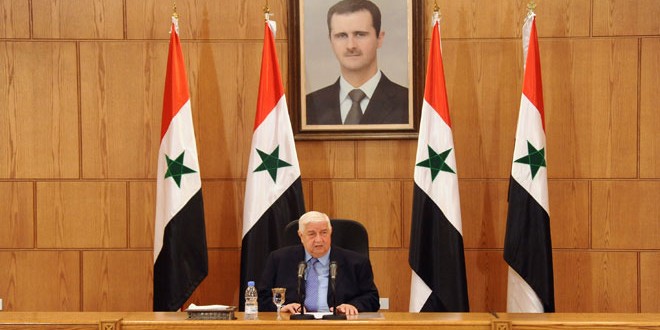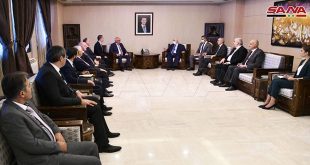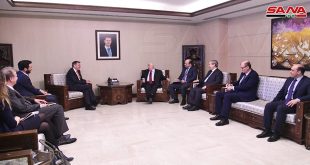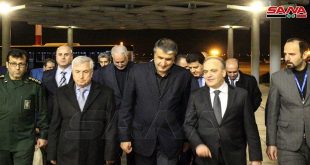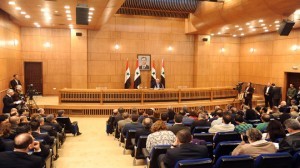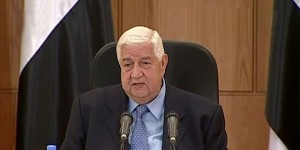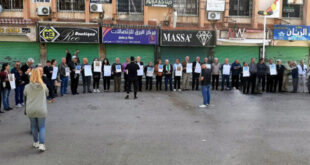Damascus, SANA – Deputy Prime Minister, Foreign and Expatriates Minister Walid al-Moallem said Saturday UN Special Envoy for Syria Staffan de Mistura has no right to talk about Syrian presidential elections, noting that the Syrian Arab Republic delegation will not wait in Geneva forever for other parties to decide to show up.
During a press conference, al-Moallem said the Syrian Arab Republic delegation received a letter from de Mistura scheduling Monday as a date for meeting at the UN HQ in Geneva within the Syrian-Syrian dialogue.
“Meeting with our delegation at first is a good thing,” he said, adding however that the Republic’s delegation “will not repeat the same mistake that happened in the previous round. They are going to wait for 24 hours only.”
“We are looking forward to having dialogue with the broadest spectrum of opposition groups in implementation of de Mistura’s mandate by the UN Security Council and the Vienna and Munich communiqués, particularly the national opposition…that is not linked to any foreign agendas,” al-Moallem added.
He commented on the UN Envoy’s recent statements setting up a schedule for Geneva talks which he said will discuss the regime, the constitution and the parliamentary and presidential elections, saying de Mistura doesn’t have the right to set a schedule, which is something up to the dialogue parties.
He went on saying that de Mistura must be aware, when he talks about the constitution, that it is the national unity government, the subject of discussion in the future, that will appoint a committee to draft a new constitution or amend the standing one, stressing that any outcome will be subject to referendum for approval.
Regarding the presidential elections, al-Moallem stressed that neither de Mistura nor anyone
else whomsoever can discuss this issue as it is “an exclusive right of the Syrian people,” dismissing what the envoy said as “a deviation from all the UN documents.”
“We will no longer accept that [de Mistura] gives up objectivity to please this or that party, and our delegation will reject any attempt to put this issue on the schedule,” he added.
As for the upcoming parliamentary elections, al-Moallem said fulfilling the elections is part of the constitution, stressing that this issue should be respected where no reservations can be accepted by anyone, calling for a high turnout of Syrian voters.
Al-Moallem stressed that Syria is committed to the cessation of hostilities agreement, noting that there have been breaches of the agreement by the armed groups that were responded to by the army sometimes and overlooked in other times.
“We affirm out armed forces’ right to respond to breaches,” he added.
He used this opportunity to urge those who have taken up weapons to utilize the agreement of the cessation of hostilities and engage in reconciliations.
The crisis, he affirmed, is coming to an end, and we hereby welcome all those who want to join our armed forces in the fight against ISIS, Jabhat al-Nusra and the terrorist organizations linked to them,” added al-Moallem.
In his comments on the talk about foreign ground intervention in Syria that came up in the past period, al-Moallem reaffirmed that “No one dares to intervene in Syria in a ground war,
and that this talk has receded, noting that US President Barack Obama’s recent speech proved that he is not going to such a war.
“I say with confidence that our people will reject any attempts at dividing [the country],” he said.
Al-Moallem referred to the recent statements about a federal model in Syria made by Russian Deputy Foreign Minister Sergey Ryabkov as circulated by the media, clarifying that the statements were not quoted objectively because Ryabkov made it contingent on the Syrians’ approval.
“I say as a Syrian citizen, and I’m sure you are with me, that we reject the talk about federalism and we are with the unity of Syria,” he added.
The Foreign Minister reiterated in comments on statements by the Saudi Foreign Minister Adel al-Jubeir that the latter is always repeating his talk at all occasions and what he said “was worthless”. “Those who live in glass houses shouldn’t throw stones,” al-Moallem said.
He asserted that the Syrian people are optimistic about the talks in Geneva, adding however that while the Syrian Arab Republic’s delegation is going to Geneva with the intention to made the dialogue a success, this issue depends also on the other parties as well.
“If those have illusions of taking over power through Geneva after they failed in the battlefield, they will fail once again,” he added.
He made it clear that nowhere in the UN documents there is something that talks about a transition period of presidency, “which is why there should be agreement on the definition of transition period.”
“As far as we understand it, transition is to move from a standing constitution to a new one and from a standing government to another that involves the other party,” he said.
Al-Moallem went on saying that the standing constitution will remain in place until holding a referendum by the Syrian people on a new or an amended one, reiterating again that there is no link between the legislative elections and what is going on in Geneva.
“We are going to Geneva and we do not know with whom we will have dialogue,” he said, reiterating that the Republic’s delegation will wait only 24 hours for the other parties to show up and if the other parties don’t show up by that time, the delegation will leave Geneva and the other party will be held responsible for the failure of the talks.
Al-Moallem affirmed that the Republic’s delegation does not put preconditions for the dialogue in Geneva, adding that those who know Syria and the Syrian leadership well realize that “we do not bow to anyone, whether states or groups.”
“We will not have dialogue with any side that discusses the position of the president. This is a red line and it is up to the Syrians alone,” he reiterated.
Asked about the Kurds in Syria, al-Moallem affirmed that “Our brothers, the Kurds, are Syrian citizens, and they are with us in the same trench against ISIS.”
Answering a question by SANA reporter on the renewed U.S. talk about training the so-called “moderate opposition” and allocating for that purpose a sum of USD 500 million that have gone to ISIS and Jabhat al-Nusra terrorists, al-Moallem wondered whether there is something called “moderate opposition”, saying Syria, throughout five years, has heard so many names and has been used to conspiring.
“Nevertheless, we are optimistic that we are beginning to get out of the crisis,” he added.
Al-Moallem said the Syrian government has managed to get humanitarian aid to enter the most affected areas based on its commitments towards its citizens, vowing to keep up efforts to deliver aid to all those who need it wherever they are on the Syrian land.
Al-Moallem pointed to the Turkish exploitation of the refugees’ issue, reminding that the Turkish regime had set up camps for the Syrian refugees even before they exited their localities.
“We are ready to take the necessary measures to ensure their return because they are our own citizens,” al-Moallem said referring to the Syrian refugees.
Al-Moallem said Erdogan is “blackmailing the entire world” by claiming that he is fighting terrorism while what he is doing is quite the reverse, pointing out that Western and European statements which feign care for the Syrian people are “lies”.
“If they truly care for the Syrian people, they would not have imposed political and economic sanctions that have negatively affected their lives,” he added.
Commenting on the Arab League’s decision against Hezbollah, al-Moallem described it as “ridiculous”, adding that the decision came as no surprise as the League had formerly authorized NATO to strike Libya.
In his reply to a question on national reconciliations, the minister said they are one of the priorities of the Syrian policy and that they contribute to quenching the flames of war, noting that the Russian role in this matter is to continue these reconciliations.
R. Milhem/H. Said
 Syrian Arab News Agency S A N A
Syrian Arab News Agency S A N A
